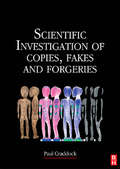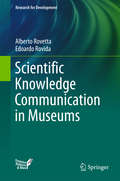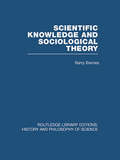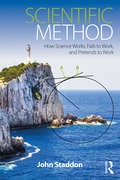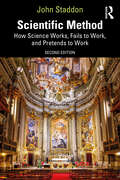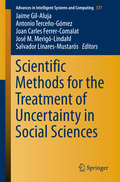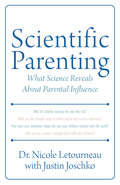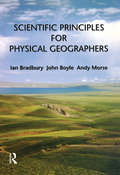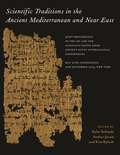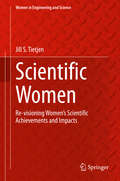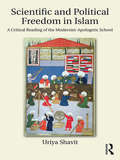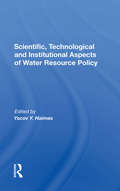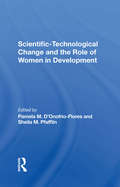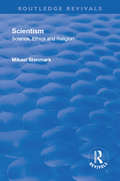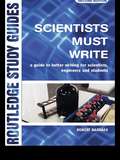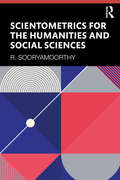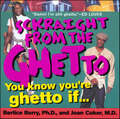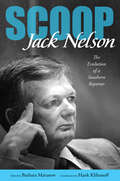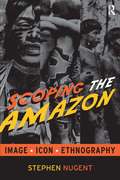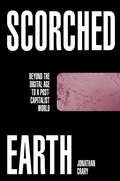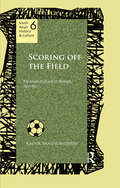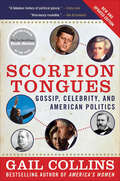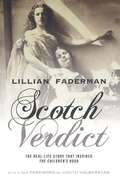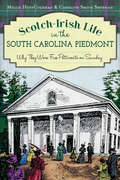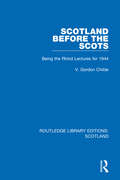- Table View
- List View
Scientific Investigation of Copies, Fakes and Forgeries
by Paul CraddockThe faking and forgery of works of art and antiquities is probably now more extensive than ever before. The frauds are aided by new technologies, from ink jet printers to epoxy resins, and driven by the astronomic prices realised on the global market. This book aims to provide a comprehensive survey of the subject over a wide range of materials, emphasising how the fakes and forgeries are produced and how they may be detected by technical and scientific examination. The subject is exemplified by numerous case studies, some turning out not to be as conclusive as is sometimes believed. The book is aimed at those likely to have a serious interest in these investigations, be they curator, collector, conservator or scientist. Paul Craddock has recently retired from the Department of Conservation, Documentation and Science at the British Museum, where he was a materials scientist.
Scientific Knowledge Communication in Museums (Research For Development Ser.)
by Edoardo Rovida Alberto RovettaThis book explains the general principles of scientific and technical communication in the context of modern museums. It also examines, with the aid of informative case studies, the different means by which knowledge can be transmitted, including posters, objects, explanatory guidance, documentation, and catalogues. Highlighting the ever more important role of multimedia and virtual reality components in communicating understanding of and facilitating interaction with the displayed object, it explores how network communications systems and algorithms can be applied to offer individual users the information that is most pertinent to them. The book is supported by a Dynamic Museums app connected to museum databases where series of objects can be viewed via cloud computing and the Internet and printed using 3D printing technology. This book is of interest to a diverse readership, including all those who are responsible for museums’ collections, operations, and communications as well as those delivering or participating in courses on museums and their use, communication design and related topics.
Scientific Knowledge and Sociological Theory (Routledge Library Editions: History & Philosophy of Science)
by Barry BarnesOriginally published in 1974. Scientific Knowledge and Sociological Theory centres on the problem of explaining the manifest variety and contrast in the beliefs about nature held in different groups and societies. It maintains that the sociologist should treat all beliefs symmetrically and must investigate and account for allegedly "correct" or "scientific" beliefs just as he would "incorrect" or "unscientific" ones. From this basic position a study of scientific beliefs is constructed. The sociological interest of such beliefs is illustrated and a sociological perspective upon scientific change is developed.
Scientific Method: How Science Works, Fails to Work, and Pretends to Work
by John StaddonThis book shows how science works, fails to work, or pretends to work, by looking at examples from such diverse fields as physics, biomedicine, psychology, and economics. Social science affects our lives every day through the predictions of experts and the rules and regulations they devise. Sciences like economics, sociology and health are subject to more ‘operating limitations’ than classical fields like physics or chemistry or biology. Yet, their methods and results must also be judged according to the same scientific standards. Every literate citizen should understand these standards and be able to tell the difference between good science and bad. Scientific Method enables readers to develop a critical, informed view of scientific practice by discussing concrete examples of how real scientists have approached the problems of their fields. It is ideal for students and professionals trying to make sense of the role of science in society, and of the meaning, value, and limitations of scientific methodology in the social sciences.
Scientific Method: How Science Works, Fails to Work, and Pretends to Work
by John StaddonThis expanded second edition of Scientific Method shows how science works, fails to work or pretends to work by looking at examples from physics, biomedicine, psychology, sociology and economics.Scientific Method aims to help curious readers understand the idea of science, not by learning a list of techniques but through examples both historical and contemporary. Staddon affirms that if the reader can understand successful studies as well as studies that appear to be scientific but are not, they will become a better judge of the “science” in circulation today. To this end, this new edition includes a new chapter, What is Science?, which points out that science, like any human activity, has its own set of values, with truth being the core. Other new chapters focus on the emergence of AI and machine learning, science and diversity, and behavioral economics. The book also includes textual features such as bullet-points and text boxes on topical issues.Scientific Method is essential reading for students and professionals trying to make sense of the role of science in society, and of the meaning, value and limitations of scientific methodology.
Scientific Methods for the Treatment of Uncertainty in Social Sciences
by José M. Merigó-Lindahl Jaime Gil-Aluja Antonio Terceño-Gómez Joan Carles Ferrer-Comalat Salvador Linares-MustarósThis book is a collection of selected papers presented at the SIGEF conference, held at the Faculty of Economics and Business of the University of Girona (Spain), 06-08 July, 2015. This edition of the conference has been presented with the slogan "Scientific methods for the treatment of uncertainty in social sciences". There are different ways for dealing with uncertainty in management. The book focuses on soft computing theories and their role in assessing uncertainty in a complex world. It gives a comprehensive overview of quantitative management topics and discusses some of the most recent developments in all the areas of business and management in soft computing including Decision Making, Expert Systems and Forgotten Effects Theory, Forecasting Models, Fuzzy Logic and Fuzzy Sets, Modelling and Simulation Techniques, Neural Networks and Genetic Algorithms and Optimization and Control. The book might be of great interest for anyone working in the area of management and business economics and might be especially useful for scientists and graduate students doing research in these fields.
Scientific Parenting: What Science Reveals About Parental Influence
by Dr Nicole Letourneau Justin JoschkoThe latest research on child development may hold the key to the parenting of the future. Combining the expertise of its author – a celebrated expert in parent-infant mental health and mother of two – with the latest findings in gene-by-environment interactions, epigenetics, behavioural science, and attachment theory, Scientific Parenting describes how children’s genes determine their sensitivity to good or bad parenting, how environmental cues can switch critical genes on or off, and how addictive tendencies and mental health problems can become hardwired into the human brain. The book traces conditions as diverse as heart disease, obesity, and depression to their origins in early childhood. It brings readers to the frontier of developmental research, unlocking the fascinating scientific discoveries currently hidden away in academic tomes and scholarly journals. Above all, Scientific Parenting explains why parenting really matters and how parents’ smallest actions can transform their children’s lives.
Scientific Principles for Physical Geographers
by Ian Bradbury John Boyle Andy MorseScience for Geography and Environment introduces students (and academics who need to brush up their knowledge!) to scientific principles in a lively and accessible way, allowing them to proceed through the text at their own pace. The book is structured thematically with a logical development of key topics, all linked by a comprehensive cross-referencing system. Concepts and principles will be grounded in everyday experience and exemplified by reference to geographical/environmental processes. The authors are also testing each stage of the text on their own students, thereby ensuring that student needs are given top priority in the book's development. Lively and relevant introduction to those scientific principles necessary to understand key processes occuring within the natural environment.
Scientific Traditions in the Ancient Mediterranean and Near East: Joint Proceedings of the 1st and 2nd Scientific Papyri from Ancient Egypt International Conferences, May 2018, Copenhagen, and September 2019, New York (ISAW Monographs)
by Sofie Schiødt Amber Jacob Kim RyholtComparative insights on astronomy, divination, and medicine from ancient textsScientific Traditions in the Ancient Mediterranean and Near East presents a collection of articles by leading scholars on scientific practices in the ancient world, with emphasis on the fields of medicine, astronomy, astrology, and other forms of divination. The essays engage with a wide variety of textual sources in many different languages and scripts from Egypt and the Near East spanning more than a millennium, including some texts that are edited and discussed here for the first time. The contributors to this volume were tasked with approaching their texts not only as specialists, but also from a cross-cultural perspective, and the resulting body of work reveals new and exciting evidence for the transfer of scientific knowledge across cultural borders in the ancient Mediterranean and Near East.This book will be of interest primarily to specialists in the history of medicine, science, divination, and magic, as well as to papyrologists, Egyptologists, and Assyriologists.
Scientific Women: Re-visioning Women’s Scientific Achievements and Impacts (Women in Engineering and Science)
by Jill S TietjenThe book highlights women’s contributions to science, which have often been marginalized and overlooked throughout history. The book first provides an overview of the development of the various science professions over time - placed in socioeconomic and cultural contexts - and women’s role in the sciences throughout history. The author then exemplifies - through history, example, and case studies - that although women were denied a scientific education until fairly recently in our history, they have nevertheless demonstrated intellect and capability in mathematics, physical sciences, life sciences, social sciences, and computer sciences throughout time. Biographies of women who contributed to these fields since before the Common Era are interwoven into a discussion of the development of the scientific profession, the advancement of education, the professionalization of the various scientific occupations, and the advancement of women in society. This book is a follow up to the author's book “Engineering Women: Re-visioning Women's Scientific Achievements and Impacts” (Springer 2017). The author, Jill Tietjen, is the series editor for Springer’s Women in Engineering and Science book series.Illuminates the many significant contributions of women in the sciences;Educates readers about the evolution of women’s participation in the scientific fields over the last century;Demonstrates how key scientific advances are driven by socio-economic and cultural contexts.
Scientific and Political Freedom in Islam: A Critical Reading of the Modernist-Apologetic School
by Uriya ShavitThe modernist-apologetic approach to the relation between revelation and science and politics has been a central part of Arab discourses on the future of Muslim societies for over a century. This approach introduced historical and theological narratives and interpretative mechanisms that contextualize reason and freedom in Islamic terms to argue that, unlike with Christianity, it is possible for Muslim societies to be technologically and politically advanced without forfeiting revelation as an all-encompassing, legally-binding guide. ‘Scientific and Political Freedom in Islam’ critically examines the coherence and consistency of modernist-apologetic scholars. This is done through a discussion of their general theorizing on reason and freedom, which is then followed by discussions of their commentaries on specific scientific and political issues in light of their general theorizing. Regarding the former, the focus is Darwin’s theory of evolution, while the universality of the "Biblical flood," the heliocentric model, the Big Bang model and Freudianism are also discussed. Regarding the latter, the focus is Islam’s desired structure of government and concept of participatory politics, while individual freedoms are also discussed. The book argues that the modernist-apologetic approach has great potential to be a force for liberalization, but also possesses inherent limitations that render its theory on the relation between revelation and freedom self-contradictory. Introducing a significant body of new information on the reasons for the failure of secularism and democracy and the attitudes towards Darwinism in the Arab world, this book is a valuable resource for students and scholars of Islamic Studies, comparative religion, democracy studies and evolution studies.
Scientific, Technological And Institutional Aspects Of Water Resource Policy
by Yacov Y. HaimesThis volume addresses water policy issues related to water resources research, ground water, water conservation, urban water systems, water resource planning, supply and demand interaction, principles and standards, and cost-benefit analysis, as well as general, institutional aspects of local, state, regional, and federal policies. The five contributors are scientists with expertise in water resources policy; their associations with Congress, the administration, state and local governments, private industry, and the academic community provide broad perspectives of their subject. The focus of their concerns is the Carter administration's Water Policy Initiatives submitted to Congress in June 1978.
Scientific-technological Change And The Role Of Women In Development
by Pamela D'onofrio-flores Sheila M PfafflinThis critique by women of male-generated and male-dominated technologies grows out of a consciousness of women as essential, yet unsalaried, participants in production processes. The authors document the ways in which women suffer from technological development in industrialized and developing countries and assess how technological developments perpetuate inequalities between nations, regions, classes, and sexes. They discuss the implementation of modern technology in agriculture and its effects on rural women, look at the position of women in the basic and applied sciences and in science policymaking, and analyze the place of women in selected technology-based industries.
Scientism: Science, Ethics and Religion (Routledge Revivals)
by Mikael StenmarkThis title was first published in 20/11/2001: The intellectual and practical successes of science have led some scientists to think that there are no real limits to the competence of scienece, and no limits to what can be achieved in the name of science. This view (and similar views) have been called Scientism. In this book, scientists' views about science and its relationship to knowledge, ethics and religion are subjected to critical scrutiny. A number of natural scientists have advocated Scientism in one form or another - Francis Crick, Richard Dawkins, Carl Sagan, and Edward O. Wilson - and their impact inside and outside the sciences is considered. Clarifying what Scientism is, this book proceeds to evaluate its key claims, expounded in questions such as: is it the case that science can tell us everything there is to know about reality? Can science tell us how we morally ought to live and what the meaning of life is? Can science in fact be our new religion? Ought we become "science believers"? The author addresses these and similar issues, concluding that Scientism is not really science but disguised materialism or naturalism; its advocates fail to see this, not being sufficiently aware that their arguments presuppose the previous acceptance of certain extra-scientific or philosophical beliefs
Scientists Must Write: A Guide to Better Writing for Scientists, Engineers and Students
by Robert BarrassGood writing and communication skills are essential in many areas of science and engineering, to help observation, thinking and remembering, to organize work and to avoid stress. Written by a scientist for scientists, this book is much more than a textbook of English grammar – it is a valuable source of information for all aspects of writing in scientific and technical situations. The only book focusing on the ways in which writing is important to the scientific community, this book assists readers on: * how to write and choice of words* using numbers and illustrations* writing project reports, theses and papers for publication* giving a short talk or presentation. The new edition of Scientists Must Write has been fully revised and updated to take account of the changes in information and communications technology including word processing and information storage and retrieval; new appendices on punctuation, spelling and computers; and useful exercises to improve writing. This popular guide will be of great use to undergraduates, postgraduates, professional scientists and engineers.
Scientometrics for the Humanities and Social Sciences
by R. SooryamoorthyScientometrics for the Humanities and Social Sciences is the first ever book on scientometrics that deals with the historical development of both quantitative and qualitative data analysis in scientometric studies. It focuses on its applicability in new and emerging areas of inquiry. This important book presents the inherent potential for data mining and analysis of qualitative data in scientometrics. The author provides select cases of scientometric studies in the humanities and social sciences, explaining their research objectives, sources of data and methodologies. It illustrates how data can be gathered not only from prominent online databases and repositories, but also from journals that are not stored in these databases. With the support of specific examples, the book shows how data on demographic variables can be collected to supplement scientometric data. The book deals with a research methodology which has an increasing applicability not only to the study of science, but also to the study of the disciplines in the humanities and social sciences.
Sckraight From The Ghetto: You Know You're Ghetto If . . .
by Bertice Berry Joan CokerIs the only art you own on your fingernails? Do you consider kool-aid one of the five food groups?You know you're ghetto if:-Turning up the heat means turning on another burner on the stove-You think of paneling as a home improvement-You use a pair of pliers to change the channel on your TV-You run to get pots as soon as it rains-Your glasses and silverware come from a gas station-Your weave is longer than your torso-You have more than ten uses for Vaseline-and one of them is shoe polishGhetto is not where you live. Ghetto is not about income or social status. Ghetto is a state of mind.
Scoop: The Evolution of a Southern Reporter
by Jack NelsonFrom a gullible cub reporter with the Daily Herald in Biloxi and Gulfport, to the pugnacious Pulitzer Prize winner at the Atlanta Constitution, to the peerless beat reporter for the Los Angeles Times covering civil rights in the South, Jack Nelson (1929–2009) was dedicated to exposing injustice and corruption wherever he found it. Whether it was the gruesome conditions at a twelve-thousand-bed mental hospital in Georgia or the cruelties of Jim Crow inequity, Nelson proved himself to be one of those rare reporters whose work affected and improved thousands of lives. His memories about difficult circumstances, contentious people, and calamitous events provide a unique window into some of the most momentous periods in southern and U.S. history. Wherever he landed, Nelson found the corruption others missed or disregarded. He found it in lawless Biloxi; he found it in buttoned-up corporate Atlanta; he found it in the college town of Athens, Georgia. Nelson turned his investigations of illegal gambling, liquor sales, prostitution, shakedowns, and corrupt cops into such a trademark that honest mayors and military commanders called on him to expose miscreants in their midst. Once he realized that segregation was another form of corruption, he became a premier reporter of the civil rights movement and its cast of characters, including Martin Luther King Jr., Stokely Carmichael, Alabama’s Sheriff Jim Clarke, George Wallace, and others. He was, through his steely commitment to journalism, a chronicler of great events, a witness to news, a shaper and re-shaper of viewpoints, and indeed one of the most important journalists of the twentieth century.
Scoping the Amazon: Image, Icon, and Ethnography
by Stephen NugentThe Amazon Indian is an icon that straddles the world between the professional anthropologist and the popular media. Presented alternately as the noble primitive, the savior of the environment, and as a savage, dissolute, cannibalistic half-human, it is an image well worth examining. Stephen Nugent does just that, critiquing the claims of authoritativeness inherent in visual images presented by anthropologists of Amazon life in the early 20th century and comparing them with the images found in popular books, movies, and posters. The book depicts the field of anthropology as its own form of culture industry and contrasts it to other similar industries, past and present. For visual anthropologists, ethnographers, Amazon specialists, and popular culture researchers, Nugent's book will be enlightening, entertaining reading.
Scorched Earth: Beyond the Digital Age to a Post-Capitalist World
by Jonathan CraryRefusing the digital world of late capitalism In this uncompromising essay, Jonathan Crary presents the obvious but unsayable reality: our &“digital age&” is synonymous with the disastrous terminal stage of global capitalism and its financialisation of social existence, mass impoverishment, ecocide, and military terror. Scorched Earth surveys the wrecking of a living world by the internet complex and its devastation of communities and their capacities for mutual support.This polemic by the author of 24/7 dismantles the presumption that social media could be an instrument of radical change and contends that the networks and platforms of transnational corporations are intrinsically incompatible with a habitable earth or with the human interdependence needed to build egalitarian post-capitalist forms of life.
Scoring Off the Field: Football Culture in Bengal, 1911–80 (South Asian History And Culture Ser.)
by Kausik BandyopadhyayThis book examines how football, as a mass spectator sport, came to represent a novel, unique cultural identity of Bengali people in terms of nation, community, region/locality and club, contributing to the continuity of everyday socio-cultural life. It explains how football became a viable popular social force with a rare emotional spontaneity and peculiar self-expressive fan culture against the background of anti-imperial nationalist movement and postcolonial political tension and social transformation. In the process, it investigates certain key questions and problems in the social history of football in Bengal, which have hitherto been ignored in the existing works on the subject.The author offers some original arguments in treating football as a cultural phenomenon, setting it squarely in the context of Bengali politics and society. It strengthens the premise that social history of South Asian sport can be meaningfully understood only by looking beyond the sports field. The study, using sport as a lens, has tried to consider some relevant themes of social history, and brings forth important issues of political and cultural history of 20th-century Bengal. Simultaneously, it highlights the transformed role of football as an instrument of reaction, resistance and subversion. It indicates that the football field of Bengal proves to be a mirror image of what society experiences in its cultural and political field, through a series of historical projections of identity, difference and culture.
Scorpion Tongues: Gossip, Celebrity, And American Politics
by Gail CollinsFrom Thomas Jefferson to William Jefferson Clinton, Scorpion Tongues is a popular history of gossip in American politics. Complete with wickedly delightful anecdotes of major and minor politicians and entertainers over the last 200 years, Gail Collins examines the evolving relationship between politicians and the press and the blurring of the lines between politicians and celebrities. Supported by extensive research and written with an entertaining flair, she speculates on how gossip reflects the current moral compass of the time, noting how a rumor, like an unpredictable summer tornado, can flatten one reputation while a similar story passes over another with hardly a rustle. "Hilariously readable" (The Economist), Scorpion Tongues offers sinful scandals and mild hearsay for every taste.
Scotch Verdict: The Real-Life Story That Inspired "The Children's Hour"
by Lillian FadermanIn 1810, a Scottish student named Jane Cumming accused her school mistresses, Jane Pirie and Marianne Woods, of having an affair in the presence of their students. Dame Helen Cumming Gordon, the wealthy and powerful grandmother of the accusing student, advised her friends to remove their daughters from the Drumsheugh boarding school. Within days, the institution was deserted and the two women were deprived of their livelihoods.Award-winning author Lillian Faderman recreates the events surrounding this notorious case, which became the basis for Lillian Hellman's famous play, The Children's Hour. Reconstructing the libel suit filed by Pirie and Woods—which resulted in a scotch verdict, or a verdict of inconclusive/not proven—Faderman builds a compelling narrative from court transcripts, judges' notes, witnesses' contradictory testimony, and the prejudices of the men presiding over the case. Her fascinating portrait documents the social, economic, and sexual pressures shaping the lives of nineteenth-century women and the issues of class and gender contributing to their marginalization.
Scotch-Irish Life in the South Carolina Piedmont: Why They Wore Five Petticoats on Sunday
by Millie Huff Coleman Caroline Smith Sherman"Five Petticoats on Sunday" was originally published in 1962. The book was a collection of columns written by Caroline S. Coleman containing stories her grandmother told about the Fairview community and the South Carolina Piedmont. Coleman's granddaughters, Millie Coleman and Caroline Sherman, have expanded the book with recipes, history and genealogical resources for an enthralling look at the lives of Scotch-Irish residents in the area from Reconstruction until the 1900s. Find out why most homes in the area had a Prophet's Room. Sit with the children as they wait for the "second table" during visiting season and learn exactly why they wore five petticoats on Sunday. Sherman and Coleman examine a time and lifestyle far away from today's modern conveniences but complete with warmth of family.
Scotland Before the Scots: Being the Rhind Lectures for 1944 (Routledge Library Editions: Scotland #6)
by V. Gordon ChildeOriginally published in 1946, this book presents in what can arguably be described as an unusual way, a slice of Scottish social life by applying to prehistory the principles of Marxism as practised by Soviet scholars of Russian prehistory. Using archaeological evidence, the author distinguishes 6 stages – from the earliest definable groups of immigrants to the Iron Age. There are 10 appendices, devoted to the typology and classification of tombs, pottery, implements and fortifications.
